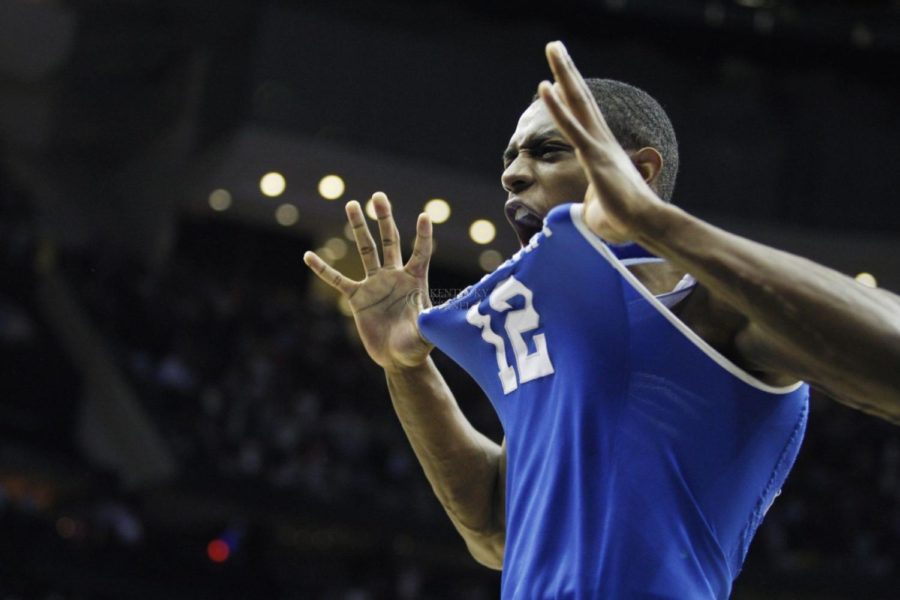Sizing up UK and UConn
Brandon Knight shows off his jersey after UK’s Sweet 16 NCAA tournament win, 62-60 against 1 seed Ohio State at the Prudential Center in Newark, New Jersey on Friday, March 25, 2011. Photo by Britney McIntosh
April 3, 2011
| KENTUCKY | CONNECTICUT |
|
The star: Brandon Knight, the cerebral point guard who has recently earned a reputation for late-game heroics with winning shots in two of UK’s four wins. Knight struggled in both of those games, but it’s the other two that give confidence. He exploded for a career-high 32 points against West Virginia. Against North Carolina – who threw their best defender at him, consistently fought over on screens to take away his pull-up three, and applied more on-ball pressure than any other team – Knight had an efficient 22 points. UConn will try largely the same thing. Shabazz Napier, who ESPN recently called the best on-ball defender in the country, said that if Knight could be stopped, UK’s offense would sputter. That may be true – which means Knight will be vital to UK’s chances. The others: Doron Lamb has had a relatively quiet postseason. It’s unsure if the ankle he injured in the SEC Tournament has played any part, but he should get open looks against UCONN. DeAndre Liggins is known as the defensive stopper, charged with slowing down Kemba Walker. But his offensive game has improved, becoming a better slasher and shooter. He carried UK against Ohio State. Darius Miller has also made great strides in getting UK to the Final Four. He carried the team through the last two weeks of the season, finally emerging into a consistent 15-20 points guy capable of leading a team to wins. He’s had a few off-nights in the postseason, but his ability to shoot the three and post up with effectiveness makes him a tough matchup that concerns other teams. |
The star: Kemba Walker. He’s carried his team through the Big East Tournament and the NCAA run, averaging double the points of anyone else on the team. He can drive, and his step-back jumper is a go-to move. How UK chooses to guard him will be interesting. They can choose to stick Liggins on him, hope he slows him down enough, and make sure the other players don’t beat UK. They could double Walker, trapping on ball screens and denying him the ball, forcing the other players step up. The likely route will be a hybrid of both, similar to how UK defended Tyler Zeller in the Elite Eight (doubling down on occasion, leaving Harrellson one-on-one on others), but either way UK goes, not letting Walker go off is a necessity. The others: Shabazz Napier. The freshman point guard comes off the bench, but plays starter’s minute. He runs the point effectively and has been praised by Jim Calhoun for his play. When Napier is in the game, it allows Walker to work off-the-ball, which can make it tougher for UK to concentrate its defense on Walker. Jeremy Lamb has also seen a massive increase in productivity. He took two shots in the December matchup between the two teams, but playing off Walker he has emerged as the second option – the “Robin” to Walker’s Batman, as UCONN players called it. |
|
The star: Josh Harrellson, who has become the best story in college basketball and has emerged as one of the most essential components of UK, on both offense and defense. He’s transformed into an offensive weapon – initiating handoffs and screen, diving on pick-and-rolls, driving to the basket, even posting up – rather than be a secondary piece waiting to gather up offensive rebounds to get points (although he still does plenty of that). Terrence Jones has also had a quiet postseason – and, really, a quiet second half of the season. He is no longer the focal point of UK’s offense, and hasn’t shown the capacity to take over a game in a while. However, he has been a contributor in the other facets of the game for UK, involving teammates and crashing the glass. Jones reeled off the first 10 UK points against Connecticut. Perhaps that memory will bring him back to his old ways for a breakout game.
|
The star: Alex Oriakhi, a big man in the middle. He’s the driving force behind Connecticut’s ability to get offensive rebounds – the team ranks seventh in the nation in offensive rebounding percentage. One of his major tasks tonight could be simply working to get Harrellson in foul trouble. If Harrellson has to sit out extended minutes, UK’s ability to hold its own in the paint greatly diminishes. Rocoe Smith, a freshman forward, provides a good compliment to Oriakhi. Smith averages 25.4 minutes, 6.5 points and 5.2 rebounds per game. His highlight of the year: in Connecticut’s win over Texas in January, Smith came down with a defensive rebound with 11.8 seconds left and the two teams tied. He promptly turned around and heaved the ball the length of the floor with 11 seconds remaining, missing badly. “He threw that up and everyone was like, ‘Oh my god, Roscoe,’” Napier said after that game. |
|
UK is treating this in the “one game at a time” mode, consistently saying that they aren’t looking too much at being in the Final Four (which seems hard to do, considering the 80,000 banners hanging around Reliant Stadium). But the players do recognize the special nature of the moment, acknowledging that this is the biggest stage of college basketball, and how special a run they used to get here. |
Connecticut’s Jim Calhoun told his players to soak up the Final Four experience, and the players sound like they are taking his advice in full. Multiple players commented on how it was a “dream” to be there, something that every kid playing basketball wants to end up doing. |




























































































































































